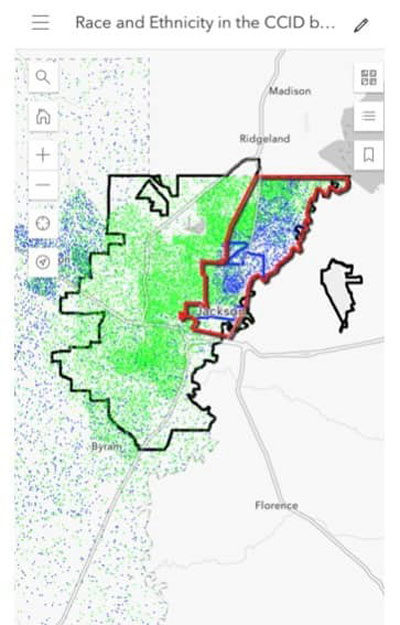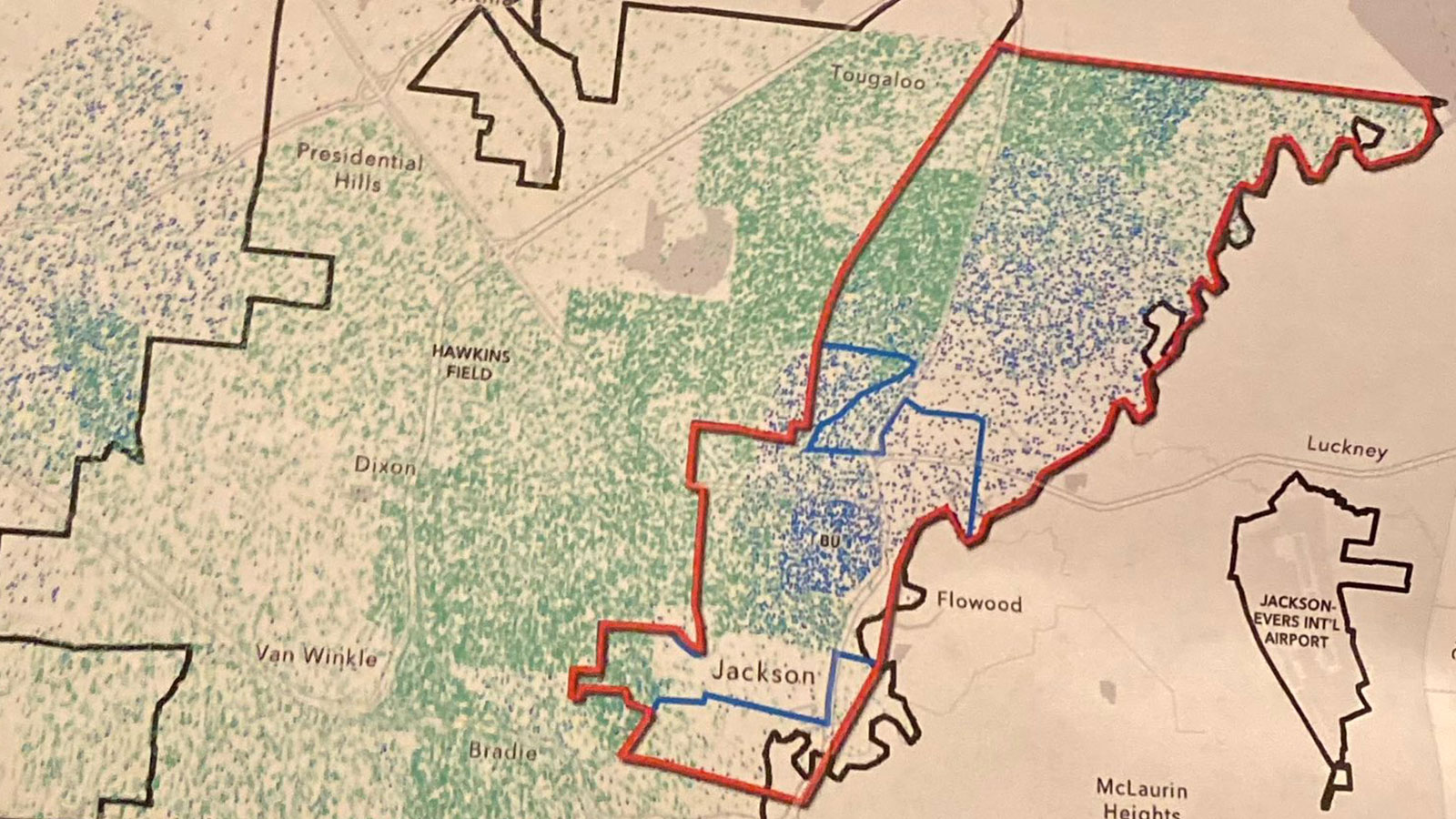Jackson, Mississippi’s water crisis had become a classic David and Goliath story: A predominantly Black city, led by its mayor Chokwe Lumumba, facing off with “good ole boy” Governor Tate Reeves and his predominantly white state legislature – a Republican super majority made possible by more than a century of violent voter suppression and racist gerrymandering.
Things came to a head last summer when decades of neglect finally took its toll leaving more than 150,000 people went without water for weeks. Jackson was all over the news, the talk show circuit, and even late night television. Although Mayor Lumumba was winning the media, Governor Reeves had firm control of the purse strings. The governor tried hard to pin the blame for the crisis – especially as the city eschewed any deal that would lead to privatizing the water system or force it to sell its airport. which was created by decades of state neglect, on Lumumba. He accused the city of not having a plan, charges Mayor Lumumba debunked in this press conference. The state came for Jackson from seemingly all angles, including the creation of an additional layer of bureaucracy for Jackson to access its American Rescue Plan Act (ARPA) infrastructure funds. Jackson was the only city in Mississippi subject to these conditions which include state approval of projects, funding, and a deadline for spending the funds once they are approved and disbursed by the state. The state has had a pattern of granting the city significantly less than it has requested through this process.
A New Day?
Things changed in the last days of the Democratic congress when the city secured $600 million in direct funding for infrastructure repairs. No state gate keeping. We thought we won.
Victory was short-lived, as the governor and state legislature got busy introducing nearly a dozen bills to seize city funding, restrict its authority, and limit resident vote and voice.
Some of the more egregious ones:
- HB 696 extends the Capitol Police jurisdiction to encompass an even larger swath of Jackson and a portion of bordering Ridgeland.
- SB 2343 gives the Capitol Police “jurisdiction relative to the enforcement of all laws of the state of Mississippi within the boundaries of the City of Jackson, Mississippi.” It also strips the city of jurisdiction over event permits in the CCID including permits for protests near the Capitol.
- HB 370, recently defeated in the house, would have made it easier for mayors to be recalled. A senate version of the bill is still active (SB2299) that doesn’t single out municipal lawmakers.
- HB 1168 would restrict Jackson’s use of its one percent sales tax revenues to water infrastructure repair. Currently, the city can use this voter approved tax for general infrastructure.
- SB 2735 restricts mayors’ use of their veto power – directly targeting Mayor Lumumba after a controversial veto of a city council vote to not to approve a contract.
- SB 2338 prohibits Jackson from implementing a water billing system that considers customer property values.
- SB 2889 would take over the federal dollars Jackson won and place it under a regional authority controlled by the state. The scheme for how the board will be appointed is quite specific. The governor gets three appointments. The lieutenant governor gets two appointments. And the mayor “gets” four appointments, which he would be required to share with two neighboring cities. Proponents of the bill argue that it is a fair deal because the city has the biggest “block” of votes. Two Republicans in lockstep get five of nine votes and the other four “Jackson” votes are to be divided among three cities. Jackson interim water manager Ted Henefin calls it, “a pure grab for money.”
Undoubtedly, the most damaging of these bills is HB 1020 which, if passed, would essentially divide the city into two separate and unequal parts. Jackson’s whitest neighborhoods, its Capitol area, downtown, and most affluent business districts would comprise the proposed Capital Corridor Improvement District (CCID) as evidenced by this map.

Race and Ethnicity in the CCID by Dot Density (Census 2020)
The blue dots represent white population. The green dots represent Black population. The red boundary is the proposed district. The black line reflects Jackson’s boundary.
The CCID was originally created in 2017 as a vehicle for funding landscaping and capital improvements in a small area around the state Capitol. The proposed, expanded CCID would extend the authority of the Capitol Police over much of Jackson without any accountability to its residents or elected leaders, create a separate governance structure made up of judges appointed by white public officials, take 18.75 percent of sales tax revenues that would have previously gone to the city, strip Hinds County’s elected judges (all of whom are Black) of authority in the CCID, and divert a number of civil and criminal cases to this new bench.
The bill’s author, State Rep. Trey Lamar (R-Senatobia) has said his bill’s intent is to make the capital city safer. Residents ask, safer for whom? Certainly not for people like Jaylen Lewis, a 25 year old Black father of two who was shot and killed by Capitol Police last September. An eyewitness to the shooting recalls that they had no idea that the car behind them was law enforcement and that Lewis felt so concerned that he called a friend to let them know he was being followed just before he was shot. Lewis was the third victim of a shooting by Capitol Police in a six week period and, according to the department, the first fatality.
The case has been “under investigation” for more than three months and the Lewis family still has no answers. Unlike the Jackson Police Department, the Capitol Police force has no oversight board or standard requirements around transparency of reporting regarding officer involved shootings. Not that the Jackson Police Department doesn’t have its problems. It is, however, at least theoretically accountable to city residents. The Capitol Police are not. HB 1020 will expand Capitol Police jurisdiction in the city, a move which residents fear will only increase state violence and terror in our communities.
On February 7, Jackson residents, including the mayor, packed the state house to watch representatives debate the bill. Members of the Black Caucus formed the only opposition to the bill, peppering the bill’s author with hours of questions and critique that laid bare the legislation’s intent and impact. Jackson’s high violent crime rate had actually gone down since 2020. In areas with community intervention programs like Credible Messengers, the drop was significant. Yet, Lamar and his colleagues weren’t interested in data or even facts, much less the truth.
When Black House members questioned Lamar about specific crime data that may have informed the bill, the racial demographics of the proposed CCID, or why he was proposing a new governance structure instead of increasing public safety funding for Jackson, Lamar repeatedly responded that he didn’t have much data or information about the area. All he knew was that there was a real problem and even incorrectly cited Jackson as having the highest crime rate in the nation.
The Republicans are lockstep in their efforts to frame Jackson as lawless and deserving of every punishment the white power structure believes is due any “rebellious slave.” And the hate and hyperbole goes all the way to the top. Earlier this week, at a press conference on economic development, Governor Reeves called Jackson “the murder capital of the world.”
Of course, framing Black people as out of control, criminal, and unfit to govern is a colonizer best practice long refined into murderous science in Mississippi. The state’s economy still depends greatly on the extraction of our wealth and labor and the exclusion of our vote and voice. Yet, watching Lamar calmly deflect more than three hours of heated debate from the Black Caucus was also a glimpse into what some are calling the new face of Jim Crow.
His soft spoken, persistent denials of racism and closing remarks praising a young Black child in attendance (the grandson of the late legislator Leonard Morris), as “the future of Mississippi” were a departure from traditional right wing vitriol. However, the impact is just as harmful. As Rep. Solomon Osborne (D-Greenwood) told Lamar and his colleagues in a passionate speech on the floor, “This is just a klan meeting with suits.”
Not many here are surprised by the legislature’s actions. It is, after all, the same body that voted 101 years ago this month to send Black people back to Africa. Still, residents aren’t giving up.
#JXNUndivided, a big tent coalition of advocacy groups, electeds, clergy, and more, is working together to stop the bills and hold on to city sovereignty and funding. Said one organizer, “There’s so much at stake but we are the people of Fannie Lou Hamer. We are the people who have been making things possible under ‘impossible’ circumstances for a very long time.”
To support the efforts of JXNUndivided, please consider signing and sharing this petition.
Makani Themba is an author and organizer based in Jackson, MS.















